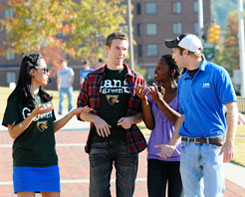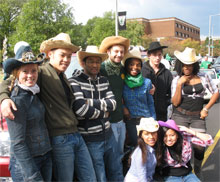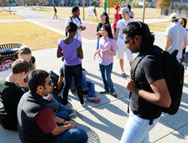Translating U.S. Culture for International Students
By Susannah Felts
 |
UAB's International Mentoring Program pairs international students such as Hwasoon Kim and Michael Gottwald (left) with student mentors such as Chinazor Iwuaba and Nathan Hadley (right). |
Every August, more than 200 international students arrive on UAB’s campus from all corners of the globe. Numerous challenges and adventures await them, from mastering Birmingham’s bus system to the first bites of Southern-style barbecue. But each of these students can tap into an experienced local guide as he or she becomes acclimated to a new culture: a volunteer from UAB’s International Mentoring Program.
Founded in 1997 and run as a joint initiative of Student Life and International Scholar and Student Services, the program accepts 14 students to be trained as mentors each fall. It was designed in response to a clear need, explains director Lura Foreman: An international student who was unhappy at UAB decided to leave the university, and in doing so wrote a letter suggesting that a mentoring program might help future students have a better experience.
International Investment
Prospective International Mentors complete rigorous training in cross-cultural communication and leadership skills, receive a crash course in UAB’s history, learn the basics of immigration requirements, and more. “We want them to be the international students’ first contact,” Foreman says. “It’s their job to make the transition a good one for these students.” The work begins the summer before new international students arrive, when each mentor is given e-mail addresses for his list of mentees—16 students on average—and asked to correspond with them to answer any questions they have prior to arrival. This early stage is where many mentors find they’re most critically helpful, often with suggestions about living arrangements or even, in some cases, schooling options for students who are bringing their families. “At that point, it’s not cookie-cutter information I’m giving out, like where a building or bus stop is,” says Stephanie Norwood, a UAB junior and former mentor. “I’m really invested; I’m telling someone where to send their kids to school.”
 |
International mentors and mentees at UAB's 2010 Homecoming parade (Click on photo to enlarge) |
“I didn’t realize their questions would be about personal stuff; I thought it would be more academic, but I enjoyed it,” says 2010 graduate Aida Moran, herself an international student from Mexico, who was an International Mentor in her junior and senior years. “It was questions like ‘What grocery store do you go to?’ ‘What kind of milk do you buy?’ In many countries there’s only one brand.”
The job carries a fair amount of status, says former mentor and 2010 graduate Elisha Gentle. “It’s considered one of the top three student representative programs; everybody knows about it,” he says. Like most International Mentors, Gentle concedes that, for the first few weeks of the fall semester, being a mentor involves a significant time commitment. “It’s not like joining a club,” Moran adds. “You have to invest your time.” But gradually, mentoring becomes less about fielding questions and attending orientation sessions and more about simply helping mentees enjoy life in Birmingham and on campus. And that’s where the fun comes in.
More Than Wal-Mart
Norwood remembers inviting some of her mentees to play laser tag. “None of us really knew what was going on; we were all kind of wide-eyed together,” she recalls. “Then we went to Dairy Queen and one of my mentees asked, ‘Is this what Americans eat all the time?’ We gave him chili cheese fries and he loved them.” Mentors also stay current on campus events and encourage their mentees to attend—including gatherings at the Smolian International House, the mentoring program’s home base. It was at one such barbecue that Norwood, tagging along with her best friend who was then an International Mentor, was inspired to apply for the program herself. “It was one of the most fun events I’ve gone to at UAB. It was a real mishmash, everybody was so interesting culturally and also really friendly and relaxed,” she says.
 |
Mentors keep up with campus events and encourage mentees to attend, ensuring that students are getting the most out of their American college experience. |
As the semester rolls along, mentors occasionally touch base with their mentees in person at campus events or over lunch. And they’re always ready with a tip or a helping hand to make everyday life more comfortable. Often, this means offering a ride to the grocery store or pointing students in the direction of certain resources, as Moran did for a student from South America who wondered where she might find a utensil for making arepas, a type of tortilla. Moran drove her to a store specializing in Hispanic food where the utensil was sold and later gave the student a bag of the kind of flour used to make arepas as a gift. “You can’t just find it at Wal-Mart,” she notes.
“It’s not so much about taking them to Vulcan or to the mall,” Foreman says. “It’s about what their wants and needs are, what makes them happy.” But, of course, if an international student needs directions to the Roman god of fire and forge? They know just whom to call to find him.
More Information